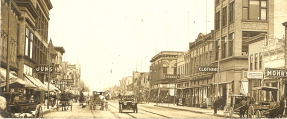SHEBOYGAN HISTORY

SHEBOYGAN HISTORY |
 |
|
| Home | Yearbooks | Students | Biographies | History | Phone Books | Churches | Pictures | Links | ||
George End, Page 546
GEORGE END is too well known to need any introduction to the people of Sheboygan County, since an active business career, covering a period of nearly thirty-seven years, has brought him into more or less intimate contact with them. He is a native of New York State, born upon a farm near Buffalo, January 10, 1830, being one of eleven children, of whom five survive, three sons and two daughters. The parents of this family, Alois and Mary (Urberger) End, emigrated from Alsace, Germany, in 1828, locating near buffalo, N. Y. A fuller account of them will be found in the sketch of Joseph G. End. When eight years of age, young George accompanied his parents to Joliet, Ill., and in March, 1840, to Milwaukee, where he did what he could toward making a living and preparing himself for the stern battles of life, which, though unperceived, were awaiting him. At the age of thirteen years ye carried the Milwaukee Sentinel. Desirous of a better education, and not having the time to spend in its acquisition during the day, he attended evening schools, and thus prepared himself for a very active and quite a remarkable life. At the age of seventeen he embarked in the dry-goods and grocery business in Milwaukee, having for a partner J. Phillips, whom some will remember as Mayor of that city. Their undertaking prospered from the start, and they worked up a flourishing trade. But the gold fever of 1849 had struck the country, and Mr. End, possessed of the spirit of adventure and the enthusiasm of a young man of twenty years, decided to try his fortune in California. The trip was made by way of New York and the Isthmus of Panama. Arriving at his destination in 1850, Mr. End remained in California until the excitement over the discovery of gold in Australia became so intense that he could no longer withstand the temptation to go thither. In company with some companions, he rigged up an old abandoned sailing-vessel and put to sea. For seventy days they were out of sight of land, being subjected to nearly every kind of weather. At length, however, they arrived, in 1851, at the new continent, which at that time was one of the wildest countries on the face of the earth, being infested by "bushrangers," and other highwaymen of the most desperate sort. With pan and shovel, Mr. End betook himself to placer-mining, being, on the whole, fairly successful. During his experience as a miner, he passed through many hardships and privations, which can only be appreciated by those who have taken part in like expeditions. From Australia, Mr. End went to Sough America, visiting Peru and other places on his homeward journey. For about a year he was employed by a railroad construction company on the Isthmus of Panama. While there he was taken with the "Panama fever," which came near proving fatal, but being of a rugged constitution, he wore out the disease. Returning to New York and thence to his home in Milwaukee, he sold to his partner his interest in the store, which had been conducted by the latter during Mr. End's absence. While in search of a fortune in the gold fields of the West, he had retained his interest in the business at Milwaukee. In that city Mr. End was married, in 1854, to Miss Anna Marie Schuler, who was born in Monheim, on the Rhine, Germany, and when thirteen years of age accompanied her parents to the United States. Mr. and Mrs., End had eight children, of whom six are living. Clara J. is at home; Marie became the wife of Gustav Schrage; Sarah wedded William Braasch, Vice-President of the Sheboygan Chair Company; Annie is the wife of Ray Nye, Dealer in grain, lumber and coal, of Fremont, Neb.; Katherine married Arthur F. Winter, Secretary and Treasurer of the M. Winter Lumber company; and Joseph W. is a manufacturer of Sheboygan. In 1854, Mr. End removed to Sheboygan and opened a general merchandising establishment, which he carried on with remarkable success until 1875, when he was succeeded by the firm of End & Kent. Both these gentlemen had been clerks for him. The former, J. G. End, is still conducting the business. Upon the organization of the Bank of Sheboygan, which succeeded the First National Bank, Mr. End was chosen President, which position he has held continuously since. He re-organized the Sheboygan Manufacturing Company, which then became the Sheboygan Chair Company, of which he has also been President since its establishment. Politically, Mr. End is a Republican, having been a Whig in early life, when he cast his first Presidential vote, in 1852, in California. Mr. and Mrs. End are members of the Roman Catholic Church, being connected with the Church of the Holy name of Jesus, of which Rev. Father Thill is pastor. Their home, one of the finest and most substantial in the city, is located on the corner of Wisconsin and Seventh Streets. In manner, Mr. End is affable and unostentatious. The rough experiences through which he has passed in rising from poverty to wealth have kept him in sympathetic touch with the laboring classes and those who are striving to accomplish something worthy for themselves. Shrewd and far-sighted in business, he is recognized as one of the ablest financiers of this section.
|
||
| Copyright © 2009 www.sheboyganhistory.com - All Rights Reserved. |